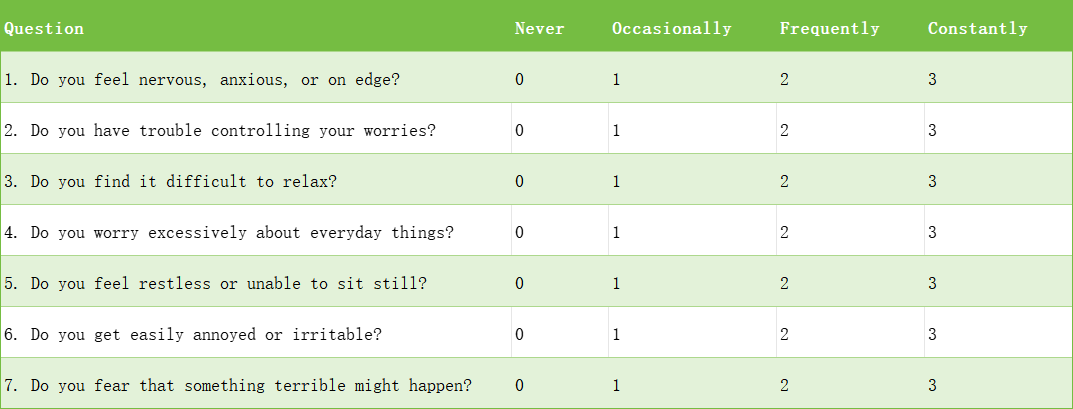

Anxiety is more than just everyday stress—it's a persistent mental health condition that can disrupt your daily life. Many people dismiss anxiety as "overthinking" or "being too sensitive," but these misconceptions prevent sufferers from seeking help. Recognizing anxiety early and learning how to manage it can make a significant difference in your well-being.

Understanding Anxiety: More Than Just Worry
Anxiety disorders go beyond temporary nervousness. They involve excessive fear, physical symptoms (like rapid heartbeat or sweating), and avoidance behaviors that interfere with work, relationships, and overall happiness. Common types include:
Generalized Anxiety Disorder (GAD) – Chronic worry about everyday life
Social Anxiety Disorder – Intense fear of social interactions
Panic Disorder – Sudden, overwhelming panic attacks
Specific Phobias – Extreme fear of particular objects or situations
7 Key Signs You Might Have Anxiety
Take a moment to reflect on these symptoms over the past few weeks:
1. Constant Nervousness – Feeling on edge even without a clear reason.
2. Uncontrollable Worry – Struggling to stop anxious thoughts.
3. Restlessness – Difficulty relaxing or sitting still.
4. Overthinking Small Things – Excessive concern about minor issues.
5. Irritability – Getting easily frustrated or angry.
6. Physical Symptoms – Rapid heartbeat, sweating, dizziness, or stomach issues.
7. Fear of the Worst Happening – Expecting disaster even when things are okay.
If several of these symptoms sound familiar, you may benefit from professional support.
Effective Ways to Manage Anxiety
While severe anxiety may require therapy or medication, many strategies can help reduce symptoms:
1. Practice Mindfulness & Relaxation
Deep Breathing Exercises – Slow, controlled breaths can calm your nervous system.
Meditation & Yoga – Helps center your mind and reduce stress.
Progressive Muscle Relaxation – Tense and release each muscle group to ease tension.
2. Challenge Negative Thoughts
Ask Yourself: "Is this worry realistic?" or "What's the worst that could happen?"
Replace Catastrophic Thinking with balanced, rational perspectives.
3. Establish Healthy Habits
Exercise Regularly – Physical activity reduces stress hormones.
Limit Caffeine & Alcohol – These can worsen anxiety.
Prioritize Sleep – Poor sleep increases anxiety symptoms.
4. Seek Professional Help
Cognitive Behavioral Therapy (CBT) – Helps reframe negative thought patterns.
Medication (if needed) – SSRIs or anti-anxiety meds can be prescribed by a doctor.
Support Groups – Sharing experiences with others can reduce isolation.
5. Create a Worry Time Routine
Instead of letting anxious thoughts take over, schedule 10-15 minutes a day to write them down. This helps contain worry instead of letting it spiral.
When to See a Doctor
If anxiety:
✔ Interferes with work, relationships, or daily tasks
✔ Causes panic attacks or extreme avoidance
✔ Leads to depression or suicidal thoughts
...it's time to seek professional help.
Final Thoughts
Anxiety is treatable, and you don't have to face it alone. Whether through self-care, therapy, or medical support, taking action can lead to a calmer, more balanced life.
This article is for informational purposes only and not a substitute for medical advice. If you're struggling with anxiety, consult a mental health professional for personalized guidance.
Would you like a self-assessment quiz to evaluate your anxiety levels further? Let me know how I can help! This quick self-assessment can help you evaluate your symptoms. Please answer based on how you've felt over the past two weeks.
Anxiety Self-Assessment Questionnaire

Scoring & Interpretation
0-5: Minimal Anxiety– Your anxiety levels appear to be within a normal range.
6-10: Mild Anxiety– You may experience occasional anxiety, but it's likely manageable.
11-15: Moderate Anxiety– Your symptoms may be affecting your daily life; consider stress-management techniques or professional support.
16-21: Severe Anxiety– Your anxiety is significantly impacting you. Seeking help from a mental health professional is recommended.
Next Steps
If your score suggests moderate to severe anxiety:
✔ Practice relaxation techniques (deep breathing, meditation)
✔ Limit caffeine and alcohol
✔ Maintain a consistent sleep schedule
✔ Consider therapy (CBT is highly effective for anxiety)
✔ Consult a doctor if symptoms persist"
